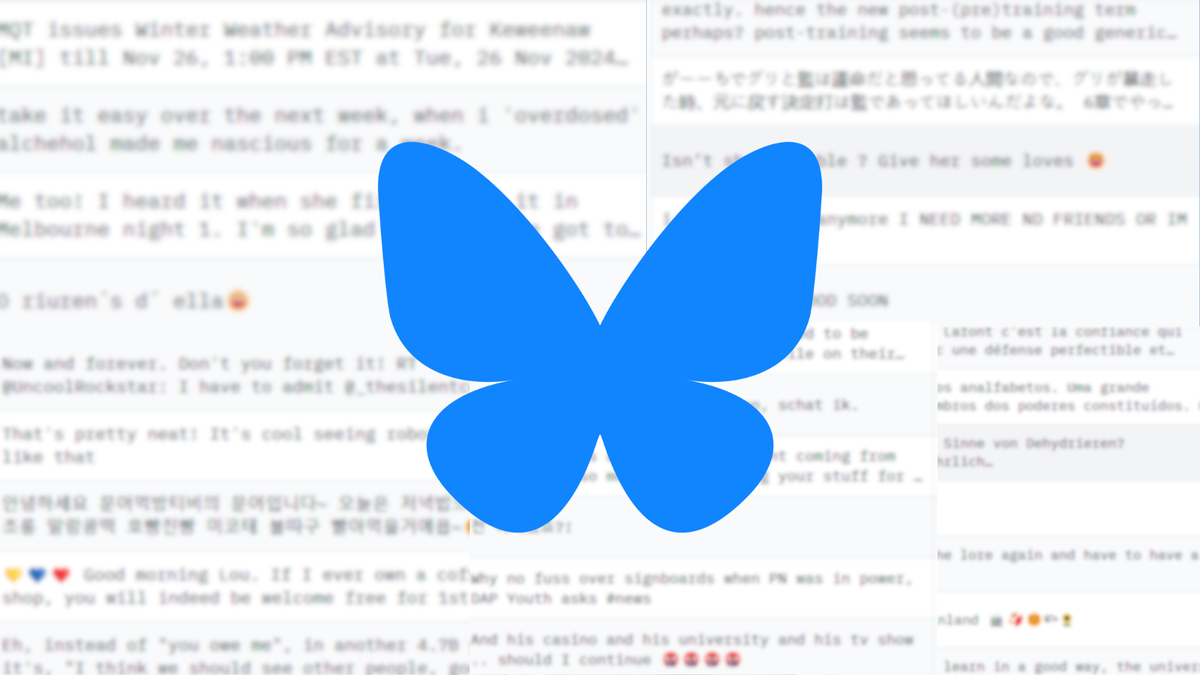A machine learning librarian at Hugging Face just released a dataset composed of one million Bluesky posts, complete with when they were posted and who posted them, intended for machine learning research.
Daniel van Strien posted about the dataset on Bluesky on Tuesday:
“This dataset contains 1 million public posts collected from Bluesky Social’s firehose API, intended for machine learning research and experimentation with social media data,” the dataset description says. “Each post contains text content, metadata, and information about media attachments and reply relationships.”
The data isn’t anonymous. In the dataset, each post is listed alongside the users’ decentralized identifier, or DID; van Strien also made a search tool for finding users based on their DID and published it on Hugging Face. A quick skim through the first few hundred of the million posts shows people doing normal types of Bluesky posting—arguing about politics, talking about concerts, saying stuff like “The cat is gay” and “When’s the last time yall had Boston baked beans?”—but the dataset has also swept up a lot of adult content, too.



Maybe. An rss reader is a very basic service with an easy way to rebuild, but killing google reader still led in part to the death of rss as a viable platform. Its barely in use anymore as a protocol, even though there are plenty of options to run now. Bluesky is a wildly more difficult and expensive tool to reanimate and compete with than rss, so it might be even deader if they ever give up.
Having data in a dead format isn’t valuable. It’s like having 100 laserdiscs and no player. They don’t do anything but look shiny. That has some value, but it doesn’t do what it is supposed to.
The data absolutely is valuable.
Having your content means having your content.
Is it? Data without an application that can use it is not useful, almost by definition.
You suddenly have a movage problem.
If the format is clearly defined, that’s literally all that matters for data to be useful. In the event they shut down, it only takes a single solo developer to make it trivial to browse your content.
Physical data is difficult to preserve. Digital in open, clearly defined formats is not.
Looks like we talking about different things. You just want a list of all your comments? To what end? Note taking? Nostalgia?
I’m talking about a social media account without a social media network. All you can do is format shift the data to have a record. You cant use it for what it was designed for in the bluesky framework.
Yes, your content. That’s the only thing anyone ever claimed you keep and the only part that would make any sense to have value. It makes it incredibly simple to make that history available elsewhere, and it’s incredibly likely that a future platform that emerges will facilitate that process, just like all the book platforms let you import from goodreads.
Its not incredibly likely you can import social media from one network to another.
It has never been supported by any social media network, and bluesky’s architecture is such that the only people that can host it are giant orgs like mega corps, who are profit driven and who want lockin, not portability.
You’re hoping it works out, but without an example of viability, it’s just conjecture that this is a real or even valuable feature.
It’s a virtual certainty, because you control the information.
The lack of imports has nothing to do with the new places not wanting it and everything to do with the old place holding your data hostage. Having a clean, formally defined source of your data is all it takes to make building an import from a popular network trivial.